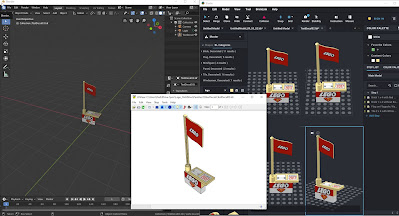Stickers, as it turns out, remain complex and time consuming in LDRAW - in the past I’ve used image files which you can embed (as a reference link to the image file) in the LDRAW dat file - these can be useful when working with image reference planes in LDCAD - however it turns out neither Studio nor Blender could read these images files when they are linked in a .dat file - Now I realise, of course, that I could add all the stickers and decals directly in Blender once the LDRAW model brick elements were complete (and I might do next time!). However I wanted to find the solution that allowed LDRAW models to move seamlessly between LDCAD, Studio and Blender - as many LDRAW parts have stickers and decals on them that appear in all packages there is clearly a solution.
Friday, 4 March 2022
Wednesday, 16 February 2022
The Chalybeate Spring - The Pantiles (Part 2)
The last build I did with custom stickers celebrated Will Bayley’s Paralympic gold medal victory back in 2016 - I’d built the model of Will’s celebration antics in Lego Digital Designer and the stickers and decals were created using numerous guides and tips from the internet. I remember it was a complicated process! This time I was building using LDRAW components in LDCAD and I planned to render in Studio (‘’cos it’s relatively easy to get a nice rendered image out!). I still much prefer to build in LDCAD as opposed to Studio so I needed to make sure that any stickers I created would transfer between LDCAD and Studio - as I discovered it still isn’t easy to make easily transferable stickers in LDRAW!
Sunday, 30 January 2022
The Chalybeate Spring - The Pantiles (Part 1)
I’ve been working on a new architectural model for a couple of months and I wanted to create the stickers for a number of elements. The model is based on the Chalybeate Spring part of The Pantiles, an historic street in Tunbridge Wells - The initial build took a couple of weeks and I created everything initially just using white bricks. The next step would be to add all the stickers - this would turn out to be a lot more complicated than I imagined!
Saturday, 4 December 2021
Heath Robinson in Real Lego (Part 4)
You can now see the final model on display at the Heath Robinson Museum. The museum is definitely worth a visit if you find yourself in that part of west London!
Wednesday, 17 November 2021
Heath Robinson In Real Lego (Part 3)
Building the final model took longer than I expected and although I needed to make a number of adjustments between the original digital model and the new real Lego one I was very pleased with the result. I felt the final build still paid tribute to both Heath Robinson's original design and my digital model. It was great experience going from digital model to physical model for such a complex and delicate build.
Wednesday, 10 November 2021
Heath Robinson In Real Lego (Part 2)
One of the things that I felt was important about building a real Lego model of one of Heath Robinson's designs was that it actually worked! Manging the rubber bands and connections between the various elements turned out to be much more challenging that I expected. There was a lot of trial and error with the placement of various elements, wheels and cogs. Plus I also added a crank handle so that you could more easily operate the model.
Here's a short video showing the mechanism working during the build process.
Monday, 25 October 2021
Heath Robinson in Real Lego (Part 1)
Back in 2018 I'd created a digital Lego model "The Professor's Invention For Peeling Potatoes" based on one of William Heath Robinson's designs. You can see it here on the Lego Idea's site and I've also blogged a little bit about it here Animating The Professor's Invention (Part 1) and here Animating the Professor's Invention (Part 2). I was pleasantly surprised when I was contacted earlier this year by Heath Robinson Museum based in Pinner, West London asking if I could build the model so they could feature it as one of their exhibits! I happily agreed to create the model out of real Lego, but I was then faced with the challenge of how I might actually do it! A few trips to Bricklink found all the parts that I needed, but I knew that the actual build would be tricky as the digital models can be more "forgiving" when it comes to the placement of elements like the rubber bands. Plus, as I discovered the rubber bands change the physical structure of the model quite a lot. There were also a number of changes and adjustments that I needed to ensure that the Lego model actually worked!
The series of images below, show the progress of the model from the original illustration, through the digital designs and early physical models, to the final model.







